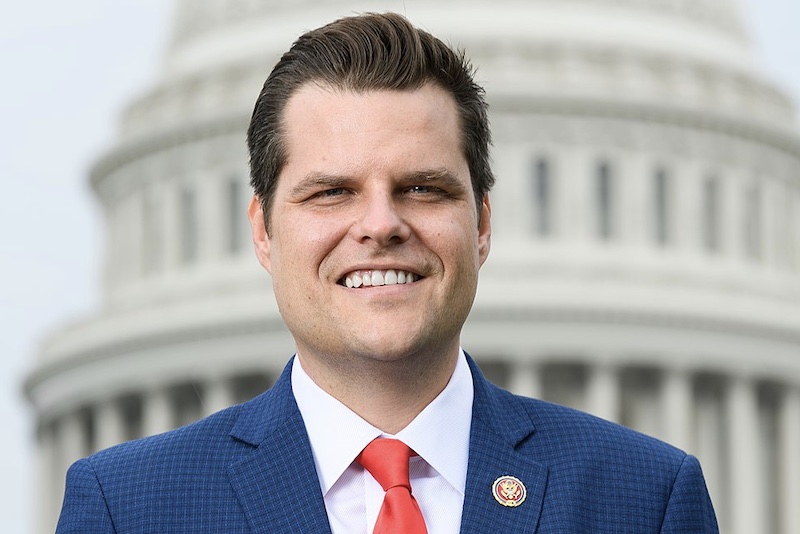Karl Racine Leads Attorneys General Against “Don’t Say Gay” Law
D.C. Attorney General Karl Racine leads coalition behind brief arguing that Florida's "Don't Say Gay" law is unconstitutional.

D.C. Attorney General Karl Racine is leading a coalition of 18 attorneys general who have signed onto an amicus brief in support of a lawsuit challenging Florida’s “Parental Rights in Education” law, which critics have dubbed the “Don’t Say Gay” law.
In the brief, the attorneys general argue that the law censors and punishes both teachers’ and students’ speech related to LGBTQ topics, is unconstitutional and causes “significant harms” to students, parents, teachers, and even other states. As such, they argue, the court should reject Florida’s motion to dismiss the case.
As passed earlier this year, the law prohibits discussion of LGBTQ issues in grades K-3 and requires that such topics be “age and developmentally appropriate” in older grades, although it does not define those terms. The Florida Department of Education is supposed to develop guidance on the topic, but has until June 30, 2023 to do so.
The brief notes that although Florida claims the law is intended to protect children and preserve parental choice, the states and jurisdictions represented by the 18 attorneys general have adopted policies that allow educators to address LGBTQ issues while also accommodating parents who do not wish to have the issue broached with their children.
“Amici States’ policies allow educators to address LGBTQ issues, and these policies demonstrate that there is no legitimate reason to ban mentioning them,” the brief reads. “Amici States also ordinarily leave educational decisions to schools and teachers, rather than allowing schools to be hauled into court over even minor instructional choices. Florida has chosen a starkly different path. It stands alone in its censorship of instruction related to LGBTQ issues and in its imposition of legal liability on school districts that do not censor LGBTQ issues. … The experience of Amici States thus makes clear that Florida’s approach is an unreasonable way to advance the state’s professed interests.”
The brief also argues that the law promotes discrimination against LGBTQ students, who are negatively impacted, both mentally and emotionally, by non-inclusive educational environments and may experience higher rates of mental health disorders and suicidal ideation as a result. The brief also says that the impact of the law extends beyond students who live in Florida.
“Notably, the damaging effects of a law prohibiting instruction on LGBTQ issues in schools do not stop at a state’s borders. When a law anywhere sends the message that some members of the community are disfavored, as the Act does, it compounds the stigma associated with being part of that community everywhere,” the brief states, citing polling from The Trevor Project. “Indeed, evidence suggests that, as with prior laws that victimize particular groups, the Act will adversely affect the mental health of LGBTQ youth in other states. For example, recent debates around laws that target the transgender community adversely affected the mental health of LGBTQ youth nationwide.”
The attorneys general argue that because Florida’s law is vague and does not explicitly define many of its key terms, including what constitutes “classroom instruction,” teachers — fearful of being disciplined or fired by administrators or sued by conservative parents empowered by the law — have begun censoring themselves, censoring lessons, banning books from classrooms, and even punishing LGBTQ students or students with LGBTQ parents who speak openly about their personal lives.
“My office has a strong track record of fighting for LGBTQ+ rights in the District and across the country to make sure that everyone can simply be who they are and love who they love,” Racine said in a statement. “Florida’s law offers no benefit to anyone and in fact puts children and families in harm’s way. We will continue to use all of our authority to help strike down this law and any other hateful, discriminatory policies that threaten people’s fundamental freedoms.”
Racine, who is leading the amicus brief with New Jersey Attorney General Matthew Platkin, is joined on the brief by attorneys general from California, Colorado, Connecticut, Delaware, Hawaii, Illinois, Maine, Maryland, Massachusetts, Michigan, Minnesota, Nevada, New York, Oregon, Rhode Island, and Washington State.
That brief is being countered by a separate brief from attorneys general in 14 Republican-led states, who argue that the Florida law does not violate the First Amendment and is necessary to prevent “children from being exposed to sexual instruction that is not age appropriate.” The attorneys general claim that the law is not discriminatory, and that the plaintiffs have failed to provide sufficient evidence that it is, arguing that the law does not explicitly mention the word ‘gay’ or the LGBTQ community, reports Forbes.
While the underlying lawsuit points to public statements made by lawmakers and state officials to argue the law was fueled by anti-LGBTQ animus, the GOP attorneys general claim that the statements don’t show “hostility toward LGBTQ persons,” and that “the statements of a few legislators cannot serve as a basis for imputing the motivations of all.”
Examples of those statements include a state lawmaker claiming the bill is needed due to the “big uptick in the number of children who are coming out as gay or experimenting,” and another senator claiming restricting discussions of LGBTQ matter is justified because “LGBT is not a permanent thing.”
The underlying lawsuit, M.A. et. al. v. Florida State Board of Education et. al., was previously dismissed in October by U.S. District Judge Allen Winsor of the Northern District of Florida, a Trump appointee, on the grounds that plaintiffs failed to show they had suffered injury or had legal standing. But Winsor did allow the plaintiffs to file a revised lawsuit seeking to block the law from being enforced.
Lawyers representing the plaintiffs, which include a lesbian couple with two children, some LGBTQ students and their parents, and teachers who are bound by the law, have since submitted a revised complaint.
In that complaint, the plaintiffs claim the law violates the due process clause through its vagueness by failing to specify what type of conduct it prevents, thus potentially resulting in arbitrary and discriminatory enforcement. The complaint also alleges the law violates the plaintiffs’ First Amendment rights, their right to equal protection under the law, and Title IX’s prohibitions on sex-based discrimination.
“In many cases, school officials explicitly have cited H.B. 1557 as the reason for their actions; in others, it is reasonable (indeed obvious) to infer as much,” the brief states. “And these instances of censorship and self-censorship have uniformly and uniquely affected LGBTQ issues and people; we are unaware of any circumstances where H.B. 1557 was invoked by a school district to change circumstances in a manner targeting straight or non-transgender people.”
Examples of this behavior by teachers and administrators include pulling LGBTQ-related books from school library shelves, removing “safe space” stickers for fear that “demonstrations of support and places of refuge for the LGBTQ community” would violate the law, the cancellation of Gay-Straight Alliances because of the inability to find a teacher willing to serve as a sponsor, and the imposition of dress codes seeking to force children to wear only clothing that conforms to stereotypical gender norms, based on their assigned sex at birth.
“These actions reinforce the basic point that everyone in Florida’s schools already understands: any speech or activity concerning LGBTQ people should be avoided upon pain of adverse consequences under H.B. 1557,” the brief states.
Support Metro Weekly’s Journalism
These are challenging times for news organizations. And yet it’s crucial we stay active and provide vital resources and information to both our local readers and the world. So won’t you please take a moment and consider supporting Metro Weekly with a membership? For as little as $5 a month, you can help ensure Metro Weekly magazine and MetroWeekly.com remain free, viable resources as we provide the best, most diverse, culturally-resonant LGBTQ coverage in both the D.C. region and around the world. Memberships come with exclusive perks and discounts, your own personal digital delivery of each week’s magazine (and an archive), access to our Member's Lounge when it launches this fall, and exclusive members-only items like Metro Weekly Membership Mugs and Tote Bags! Check out all our membership levels here and please join us today!





















You must be logged in to post a comment.